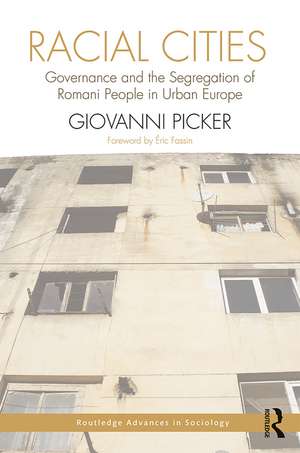Racial Cities: Governance and the Segregation of Romani People in Urban Europe: Routledge Advances in Sociology
Autor Giovanni Pickeren Limba Engleză Paperback – 14 mai 2019
By focusing on socio-economic transformations and social dynamics in contemporary Cluj-Napoca, Pescara, Montreuil, Florence and Salford, Picker detects four local segregating mechanisms, and comparatively investigates resemblances between each of them and segregation in French Rabat, Italian Addis Ababa, and British New Delhi. These multiple global associations across space and time serve as an empirical basis for establishing a solid bridge between race critical theories and urban studies.
Racial Cities is the first comprehensive analysis of the segregation of Romani people in Europe, providing a fine-tuned and in-depth explanation of this phenomenon. While inequalities increase globally and poverty is ever more concentrated, this book is a key contribution to debates and actions addressing social marginality, inequalities, racist exclusions, and governance. Thanks to its dense yet thoroughly accessible narration, the book will appeal to scholars, undergraduate and postgraduate students, postdoctoral researchers, and equally to activists and policy makers, who are interested in areas including: Race and Racism, Urban Studies, Governance, Inequalities, Colonialism and Postcolonialism, and European Studies.
| Toate formatele și edițiile | Preț | Express |
|---|---|---|
| Paperback (1) | 369.73 lei 6-8 săpt. | |
| Taylor & Francis – 14 mai 2019 | 369.73 lei 6-8 săpt. | |
| Hardback (1) | 998.40 lei 6-8 săpt. | |
| Taylor & Francis – 27 feb 2017 | 998.40 lei 6-8 săpt. |
Din seria Routledge Advances in Sociology
-
 Preț: 385.11 lei
Preț: 385.11 lei -
 Preț: 152.39 lei
Preț: 152.39 lei -
 Preț: 309.12 lei
Preț: 309.12 lei - 20%
 Preț: 296.88 lei
Preț: 296.88 lei -
 Preț: 334.09 lei
Preț: 334.09 lei -
 Preț: 204.46 lei
Preț: 204.46 lei - 9%
 Preț: 865.99 lei
Preț: 865.99 lei -
 Preț: 310.81 lei
Preț: 310.81 lei -
 Preț: 326.40 lei
Preț: 326.40 lei -
 Preț: 311.41 lei
Preț: 311.41 lei - 8%
 Preț: 388.98 lei
Preț: 388.98 lei -
 Preț: 288.87 lei
Preț: 288.87 lei -
 Preț: 310.29 lei
Preț: 310.29 lei -
 Preț: 311.41 lei
Preț: 311.41 lei -
 Preț: 303.43 lei
Preț: 303.43 lei -
 Preț: 301.51 lei
Preț: 301.51 lei -
 Preț: 326.63 lei
Preț: 326.63 lei -
 Preț: 152.30 lei
Preț: 152.30 lei -
 Preț: 318.95 lei
Preț: 318.95 lei -
 Preț: 317.48 lei
Preț: 317.48 lei -
 Preț: 312.86 lei
Preț: 312.86 lei -
 Preț: 160.59 lei
Preț: 160.59 lei -
 Preț: 334.09 lei
Preț: 334.09 lei -
 Preț: 309.46 lei
Preț: 309.46 lei -
 Preț: 386.78 lei
Preț: 386.78 lei - 8%
 Preț: 388.92 lei
Preț: 388.92 lei -
 Preț: 310.60 lei
Preț: 310.60 lei -
 Preț: 309.99 lei
Preț: 309.99 lei -
 Preț: 310.51 lei
Preț: 310.51 lei -
 Preț: 283.77 lei
Preț: 283.77 lei -
 Preț: 312.28 lei
Preț: 312.28 lei -
 Preț: 295.10 lei
Preț: 295.10 lei - 8%
 Preț: 383.57 lei
Preț: 383.57 lei - 18%
 Preț: 1111.55 lei
Preț: 1111.55 lei -
 Preț: 445.38 lei
Preț: 445.38 lei - 18%
 Preț: 701.88 lei
Preț: 701.88 lei - 18%
 Preț: 1053.92 lei
Preț: 1053.92 lei - 18%
 Preț: 1002.36 lei
Preț: 1002.36 lei - 18%
 Preț: 1057.89 lei
Preț: 1057.89 lei - 16%
 Preț: 248.31 lei
Preț: 248.31 lei - 18%
 Preț: 1003.30 lei
Preț: 1003.30 lei - 18%
 Preț: 1109.21 lei
Preț: 1109.21 lei - 18%
 Preț: 998.56 lei
Preț: 998.56 lei - 18%
 Preț: 1061.22 lei
Preț: 1061.22 lei - 18%
 Preț: 1058.06 lei
Preț: 1058.06 lei - 18%
 Preț: 1002.36 lei
Preț: 1002.36 lei - 18%
 Preț: 1113.12 lei
Preț: 1113.12 lei
Preț: 369.73 lei
Nou
Puncte Express: 555
Preț estimativ în valută:
70.75€ • 74.40$ • 58.46£
70.75€ • 74.40$ • 58.46£
Carte tipărită la comandă
Livrare economică 17 aprilie-01 mai
Preluare comenzi: 021 569.72.76
Specificații
ISBN-13: 9780367331528
ISBN-10: 0367331527
Pagini: 190
Ilustrații: 3
Dimensiuni: 156 x 234 x 13 mm
Greutate: 0.45 kg
Ediția:1
Editura: Taylor & Francis
Colecția Routledge
Seria Routledge Advances in Sociology
Locul publicării:Oxford, United Kingdom
ISBN-10: 0367331527
Pagini: 190
Ilustrații: 3
Dimensiuni: 156 x 234 x 13 mm
Greutate: 0.45 kg
Ediția:1
Editura: Taylor & Francis
Colecția Routledge
Seria Routledge Advances in Sociology
Locul publicării:Oxford, United Kingdom
Public țintă
Postgraduate and UndergraduateCuprins
List of illustrations
Foreword by Éric Fassin
Acknowledgments
Introduction: Inside segregation
1. Nodes
Colony: segregation rationales
Metropole: from sedentarization to segregation
Conclusion: toward an ethnography of nodes
2. Displacement
Displacing the hygiene threat
Racist order, racial icons
Conclusion: evicted from diversity
3. Omission
Governing an "ethnic bomb"
"Racism is not a problem"
Conclusion: racism and neoliberal doxa
4. Containment
Colonial genesis
Containing the outlandish
Conclusion: a spatio- racial political technology
5. Cohesion
Background
Segregating cohesion
Conclusion: racially structured cohesion
6. Correspondences
Assembling nodes
Colonial past, neoliberal present: depoliticization and racelessness
Conclusion: defining racial cities
7. Conclusion: Beyond segregation?
For the European city yet to come
Urban research and practice
Archives
References
Index
Foreword by Éric Fassin
Acknowledgments
Introduction: Inside segregation
1. Nodes
Colony: segregation rationales
Metropole: from sedentarization to segregation
Conclusion: toward an ethnography of nodes
2. Displacement
Displacing the hygiene threat
Racist order, racial icons
Conclusion: evicted from diversity
3. Omission
Governing an "ethnic bomb"
"Racism is not a problem"
Conclusion: racism and neoliberal doxa
4. Containment
Colonial genesis
Containing the outlandish
Conclusion: a spatio- racial political technology
5. Cohesion
Background
Segregating cohesion
Conclusion: racially structured cohesion
6. Correspondences
Assembling nodes
Colonial past, neoliberal present: depoliticization and racelessness
Conclusion: defining racial cities
7. Conclusion: Beyond segregation?
For the European city yet to come
Urban research and practice
Archives
References
Index
Recenzii
Racial Cities, in its remarkable intersection of diverse strands of thought, demonstrates how the persistence of everyday colonialism roosts in Europe through the ordinary and proliferating segregations based on race continuously reinvented within the problematizing of Gypsy urban areas.
In elaborating the racial complexion of European urban life, Picker emphasizes how the ordering of urban space remains reliant on the way specific territories are constituted to give body and visibility to open-ended threats, on the ways in which the rationales underlying segregations can be dismissed, remade, or rendered self-evident, where political deliberation is substituted by technical considerations, and where unyielding convictions about fundamental differences can silently operate through multiple vernaculars.
AbdouMaliq Simone, Research Professor, Max Planck Institute for the Study of Religious and Ethnic Diversity.
Racial Cities sounds a vital alarm over everyday and institutionalized racism and discrimination vis-à-vis Romani people, defined at once as a scourge and threat, in a race-blind Europe. Not only does Giovanni Picker draw needed light to the "organizing logic" and specificity of race, biologized as culture, in neoliberal states from the East to the West, he also illuminates how Romani segregation is a conspicuous lived-reality—hidden in plain sight—that indexes a naturalized and under-analyzed anti-Romism, and thereby a distinct yet familiar race question in Europe. Capturing the nexus between practices of expulsion and disposable confinement, Picker reinforces the fact that space is indeed raced.
Trica Keaton, Associate Professor, Dartmouth College and author of .Muslim Girls and the Other France
In elaborating the racial complexion of European urban life, Picker emphasizes how the ordering of urban space remains reliant on the way specific territories are constituted to give body and visibility to open-ended threats, on the ways in which the rationales underlying segregations can be dismissed, remade, or rendered self-evident, where political deliberation is substituted by technical considerations, and where unyielding convictions about fundamental differences can silently operate through multiple vernaculars.
AbdouMaliq Simone, Research Professor, Max Planck Institute for the Study of Religious and Ethnic Diversity.
Racial Cities sounds a vital alarm over everyday and institutionalized racism and discrimination vis-à-vis Romani people, defined at once as a scourge and threat, in a race-blind Europe. Not only does Giovanni Picker draw needed light to the "organizing logic" and specificity of race, biologized as culture, in neoliberal states from the East to the West, he also illuminates how Romani segregation is a conspicuous lived-reality—hidden in plain sight—that indexes a naturalized and under-analyzed anti-Romism, and thereby a distinct yet familiar race question in Europe. Capturing the nexus between practices of expulsion and disposable confinement, Picker reinforces the fact that space is indeed raced.
Trica Keaton, Associate Professor, Dartmouth College and author of .Muslim Girls and the Other France
Descriere
Building on nearly a decade of ethnographic and historical research in Romania, Italy, France and the UK, Racial Cities goes beyond race-blind and conventional approaches to spatial segregation to uncover the multiple connections between the contemporary segregation of Romani people and European colonial urban governance.















